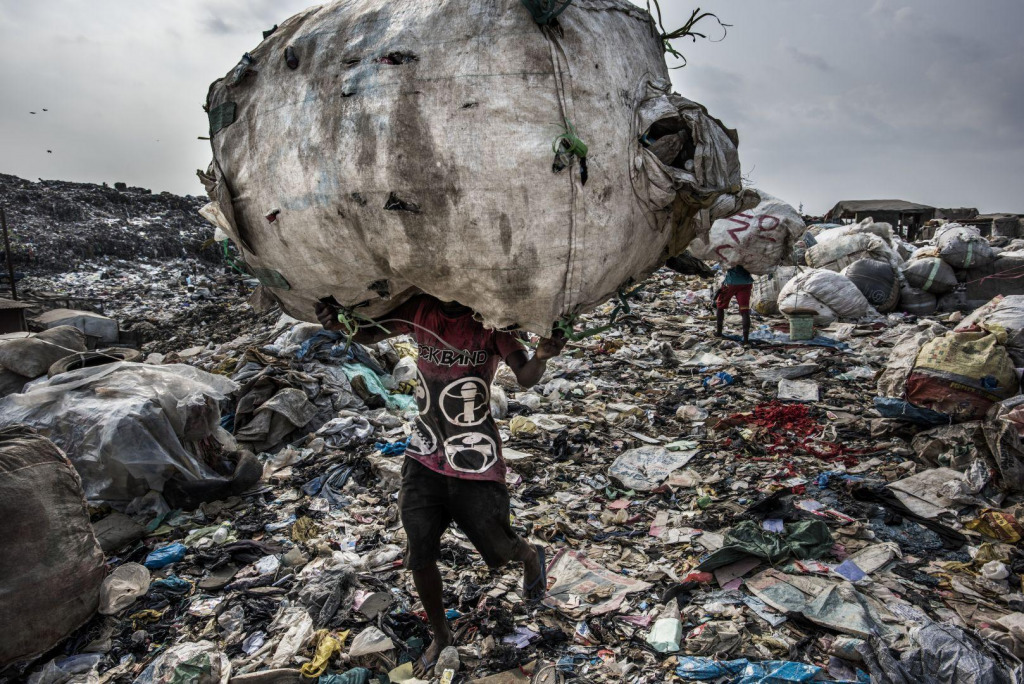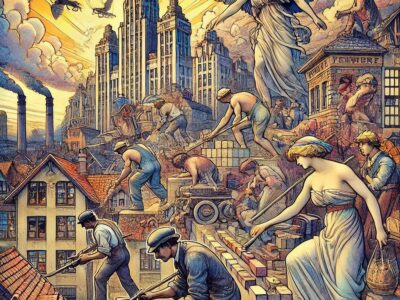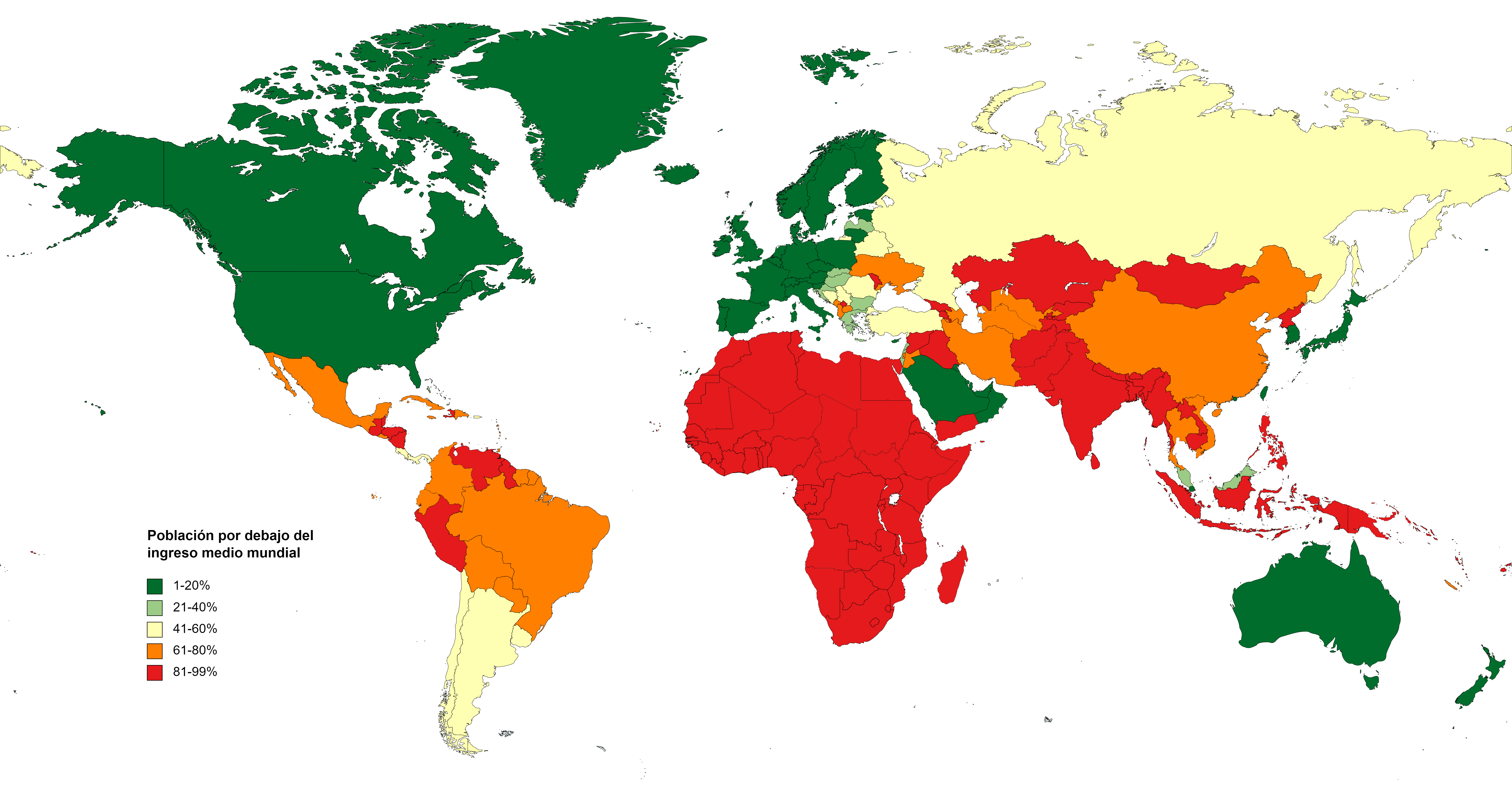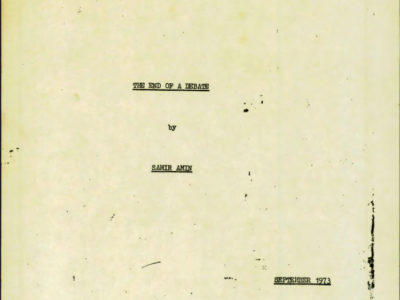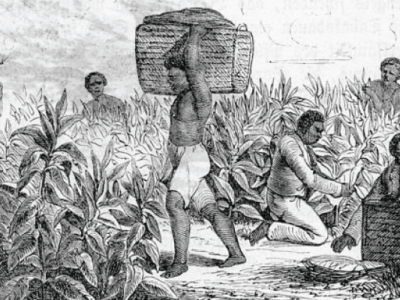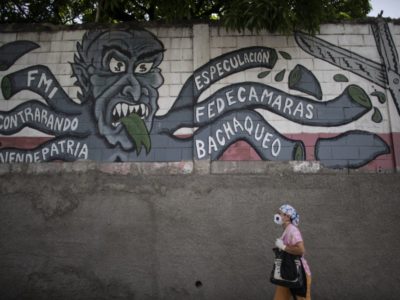The problem of destruction of the environment, contrary to what is shown in the corporate mass media, must be ripped out of national boundaries (especially the boundaries of the few most developed countries) and regarded from the perspective of economic and political relations of all the countries of the world as a whole.
Upon looking at the world organization from that angle, we may savvy what is to be done about the hierarchical division between countries, in which the countries at the bottom of the hierarchy produce raw materials and semi-finished products for the countries in the middle of the hierarchy, who then make final products for consumption intended for those at the top.
Such an organization of the world order is a consequence of economic processes whose goal is to accumulate wealth at the top of the hierarchy, or what we otherwise call “capitalism”. Capitalism as economic world order is on the one hand maintained by global political institutions such as the International Monetary Fund (IMF), the World Bank, the World Trade Organization (WTO), etc.; while on the other hand, it is “secured” by the military force of the wealthiest and most developed countries (NATO and its allies) and political policies in favor of the elites of the states at the top of the hierarchy. The mechanisms of the market economy supported by the territorial division in form of states and borders, or the so-called intrastate system, enable the flow of value from the bottom of the hierarchy to its top.
There are almost no products being produced entirely in one country (from raw materials to final product). Instead, the production takes place through so-called global commodity chains, in which hundreds, and for certain products, even thousands of individual suppliers and manufacturers spread all across the world take part. If the environmental problem is a direct consequence of the capitalist way of production–the kind of production that includes dozens of countries per product–how do we not link the “ecological catastrophe” to all other problems that most of the world faces, and that the handful of the most developed countries would rather cover up? Is it even possible to resolve the issue of ecology, environmental degradation, and climate change within the scope of the capitalist world of production?
Ecologically Unequal Exchange
One of the mechanisms of accumulation of wealth in the developed countries on the top of the hierarchy is the so-called unequal exchange. More precisely, if one of the countries doing the exchange has low worker’s income (in poor countries), and the other country has high worker’s income (in wealthy countries), the value produced in the first country is transferred into the second.
Let us explain why it comes to this in a simplified way: Marx saw that national economies produce what he called “General Rate of Profit” – when a new branch of production appears for capital inflow, the rate of profit falls, and when it falls to a low enough level, the investments stop and relocate to another, more profitable branch. During a long enough period, the relocation of the capital from one branch to another makes all the branches give a similar, so-called general rate of profit, that. That is, it evens out the profit of all branches taken together, forming an average common to them all. This happens because of the mobility of capital – its feature to be freely invested wherever needed.
At the same time, Marx noted a similar thing happening with workers’ salaries. When there is a high demand for workforce in one branch, the workers are paid higher salaries, so they naturally gravitate to higher-paying branches. This mobility of the workforce makes average salaries grow and equalize over a longer period of time, much like the mobility of capital forms a general rate of profit.
We want to focus on international trade, not national. In that context, capital has the same mobility as in the national–it can relocate from one country to another)–but not the workforce–its mobility is limited by state borders. Because of that effect, a general rate of profit is formed internationally, but labor wages aren’t equalizing, which makes the low salaries stay low.[1]
One way to understand unequal exchange is this: if we assume that technology all across the world is the same or similar, that productivity of the Third World is the same or similar, while the only difference is the cost of the workforce, then we may presume that the value made by a poor country worker is the same as the value made by a rich country worker. However, the produced item is being sold as if produced by the rich country worker, meaning that the source of profit for the capitalist is in the discrepancy of salaries between the worker of the rich country and the worker of the poor country.
The basic idea of unequal exchange of goods in the sense that a value produced by one party is appropriated by another party in case of unequal conditions also applies to the idea of “ecologically unequal exchange”. More precisely, as “ratio of unequal exchange between countries holding different positions in the world-system”. This theoretical perspective focuses not only on the damage being done to the environment of poor countries as a consequence of trade with wealthy countries but also on its effects on health, safety, and socio-economic occurrences. Likewise, we must stress the fact that this way of “exchange” is far more beneficial for wealthy countries than for the poor ones.[2] Wealthy countries “export” pollution and ecological degradation into poor countries, intending to make the countries of production pay the expenses of environmental protection, but not the company that manages the production (typically a transnational corporation from another, usually more developed zone). The aforementioned global institutions are a part of maintaining the order that “expropriates ecological well-being” of poor countries by the wealthy ones.[3]
The main motive behind the ecologically unequal exchange is first and foremost an economic one. The biggest companies tend to increase the income and competitiveness of their products on the market by reducing the cost of production. Or we can put it like this: they tend to snatch the biggest possible ratio of value that is produced somewhere else. The source of that value can be human labor (paid, unpaid, or underpaid paid) or expenses that the owner of capital should bear, but someone else bears them instead.[4]
Expenses of ecological damage belong in the last category, and that’s called externalization. As an example, we can mention the transnational corporation Apple, one of the most famous examples of an efficient commodity chain. Every produced iPad takes almost 15kg of ore, almost 300l of water, as well as a fossil fuel for power used in production that emits 30kg of carbon monoxide. First-generation of iPads made 47.5kg of greenhouse gas per product. If the iPad were produced in the USA, every product, for ecological expenses only, would cost 190 dollars more.[5]
It is clear that the iPad has the same components and takes the same amount of work wherever produced, so the pollution is the same independent of the location of the factory. Production of the iPad in Asian countries means that those countries would carry the burden of pollution, but also the cost of its elimination. That’s how the aforementioned “export of pollution” functions, and there are two winners in this combo: Apple as the owner of the product on the market, but also the end consumer in the wealthy countries who gets the product way below its value.
Consequences of Ecologically Unequal Exchange
Although global warming is one of the principal, biggest, and most urgent problems, it is not the only one. To reduce all ecological problems to global warming is to close our eyes to reality. Truth be told, that may be easier than it sounds because that reality hits countries and populations somewhere far from those who focus on CO2 emissions. Degradation of the eco-system in peripheral countries leads to a whole chain of problems. Let us look at some examples.
In the Turkish town of Bergama, EuroGold Group was given a license for the exploitation of gold. However, EuroGold used cyanide, which leads to the destruction of the soil and the living hood of local farmers. [6]
In the Niger Delta oil is exploited. Oil drilling is destroying the water and they are a serious threat to local communities who survive thanks to fishing. The situation is so critical that in the region there are a number of guerilla groups who attack the oil rigs.
The reach of ecological consequences is fairly evident in the case of coffee farming in Uganda. Most farmers in Uganda live on agricultural products they breed themselves. However, they need money in order to send their children to school, and the only way to acquire it is through coffee breeding. Coffee breeding is the cause of deforestation in the mountains, which increased the number of landslides over the years. Every year the number of farmers who lose their lives due to landslides gets bigger. Aside from landslides, the number of malaria cases increased because coffee needs shade and moisture, the ideal conditions for mosquitoes to breed. By expanding the areas for coffee farming, the number of mosquitoes increases, and farmers often take mosquito nets off of their houses and use them to make shade, which makes them far more vulnerable and exposed to bites and malaria.[7]
The Green New Deal
The media frenzy around the ecological catastrophe aims to make a positive public opinion about the so-called Green New Deal. It is about a series of Keynesian policies alike to Roosevelt’s New Deal – policies close to social democracies of post-war Europe that combined state investments in military and infrastructure with social policies, salary increments, and other benefits. This time the emphasis is on the investment to protect the environment and in the process to create welfare for the citizens.
The originators of this initiative are the “progressive” US democrats, who are enjoying the support of the UN. Due to the forthcoming recession, they call for an abandonment of austerity measures, but also for infrastructural state investments like ecological transport, “clean” energy, and food systems, as well as investments into developing countries, with a goal to create a “greener” industry.[8]
This is an open confession that the unrestrained forces of the market and the logic of free trade lead directly into a crisis, not out of it. More accurately, they lead to the impossibility of the market and financial capital to create growth, development, and prosperity. A call to an open intervention of the state to break the sacred rule of liberalism about the non-intervention in trade relations, only means that the oligarchy is looking for a way to get out of the problem at the expense of its profits. However, that solution only means that the problems will be “nationalized” (taxpayers’ money will finance the growth of private businesses without making the state a competitor for private capital), but also that the West will resolve its own problems by imposing the “green solution” on the rest of the world, by any means necessary (political, economic and through global institutions).
Let’s revisit the externalization and the shifting of expenses outside of the production process: just as the burden of pollution is shifted onto the peripheral states, the burden of making the industry “green” falls on the state. When it comes to most developed countries, the effect of this policy is different.
It is expected that the state will invest in a new, greener infrastructure, which can only mean a few things:
- to use public means to create demand where it otherwise couldn’t be created–another way of externalization, companies believing that the infrastructure cost of their business should fall on the state;
- to subsidize the shift to an ecological production–the cost of shifting to a new way of production shouldn’t be paid for by the companies, and the whole operation shouldn’t severely affect the profit margin and growth, and
- to invest in the development of new, greener technologies.
This way a monopoly is created on the global market in the field of green technologies, by protecting the new technologies with intellectual rights and patents–another way of robbing other countries of their wealth–and it guaranties the owner of that technology that they will harvest high profit just up to that technology spreading so far and wide that it becomes unprofitable at the level of economic and social development of the Global North (at this point it would migrate to Global South to leverage more competitive labor market). At the same time, they will be able to compel manufacturers and suppliers from poor countries to use them, and that way they will create a market for their capital green products, but also maintain the dependency of those countries in economic, and therefore political sense.
Subsidies may be looked upon as a protectionist measure. Wealthy countries are protecting their businesses by bearing a part of the expense, which brings down the price of their products on the global market. On the other hand, peripheral countries will be compelled to import green technology, to pay for the patents and to maintain the free trade regime. That way they won’t be able to independently develop their own green technology because violating the patents would have a negative economic consequence (they wouldn’t be able to find a buyer on the global market), and their green technology would be uncompetitive, it would be more costly than the imported ones. Thus, while poor countries are expected to be almost religiously devoted to free trade, rich countries are openly interfering with it by protectionist measures, in order to ensure their economic hegemony.
The Green New Deal is nothing but a political maneuver to get out of the neoliberal deadlock over the backs of peripheral countries, just as it was the custom with all previous solutions to a crisis. That’s the solution for a crisis in rich countries, and it means exporting it to poor countries. It is pretty clear that the main cause behind the ecological destruction is the capitalist logic, universal for the whole planet. Changing the way of accumulation doesn’t change the logic of the system, and therefore doesn’t eliminate the cause of ecological problems. The biggest share in those problems will still go to those whose share in the wealth is the smallest.
In the end, we should answer the questions posed at the beginning of the text. The ecological problem is critical and it leads to a catastrophe. Equally, it is a part of a chain of other problems, and a direct consequence of political and economic world order. The problem of climate change cannot be regarded, and let alone solved, as if it were in a vacuum; it can be completely solved only by transitioning to a sustainable way of production, incompatible with the capitalist logic of accumulation.
- https://anti-imperialist.net/2019/05/31/arghiri-emmanuel-unequal-exchange-revisited/ ↑
- Paul K. Gellert, R. Scott Frey, Harry F. Dahms, “Introduction to Ecologically Unequal Exchange in Comparative Perspective”, JOURNAL OF WORLD-SYSTEMS RESEARCH, Vol. 23 Issue 2 ↑
- David Ciplet, “Splintering South: Ecologically Unequal Exchange Theory in a Fragmented Global Climate”, JOURNAL OF WORLD-SYSTEMS RESEARCH, Vol. 23 Issue 2 ↑
- Donald Clelland, “Unpaid Labor as Dark Value in Global Commodity Chains” ↑
- Donald Clelland, “The Core of the Apple: Dark Value and Degrees of Monopoly in Global Commodity Chains”, JOURNAL OF WORLD-SYSTEMS RESEARCH ↑
- https://newsolution17.wordpress.com/2017/06/01/bergama-against-eurogold/ ↑
- Kelly F. Austin, “Brewing Unequal Exchanges in Coffee:<br /> A Qualitative Investigation into the Consequences of the Java Trade in Rural Uganda”, JOURNAL OF WORLD-SYSTEMS RESEARCH, Vol. 23 Issue 2 ↑
- https://www.france24.com/en/20190925-un-calls-for-global-green-new-deal-to-boost-world-economy ↑
This text has been originally published on the Serbian anti-imperialist portal Princip.Info. This is an updated and revised version.

